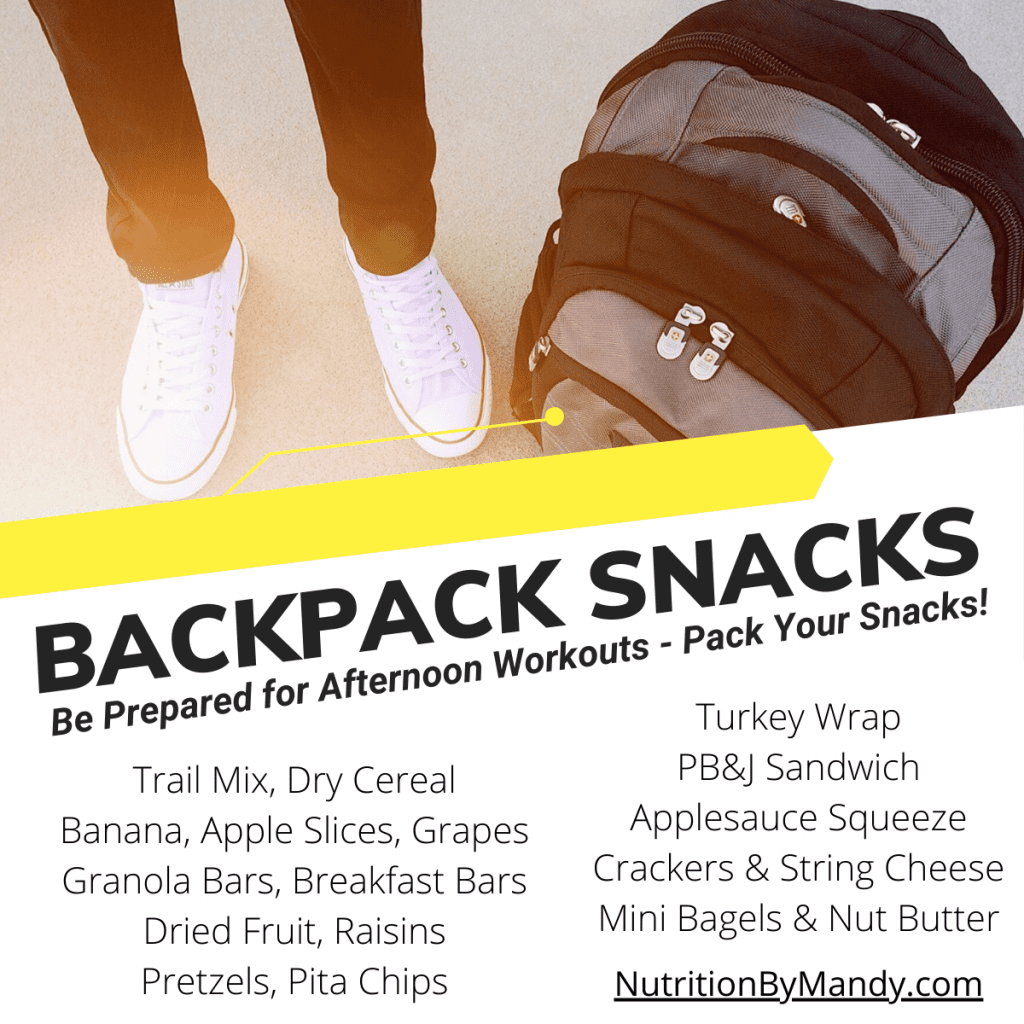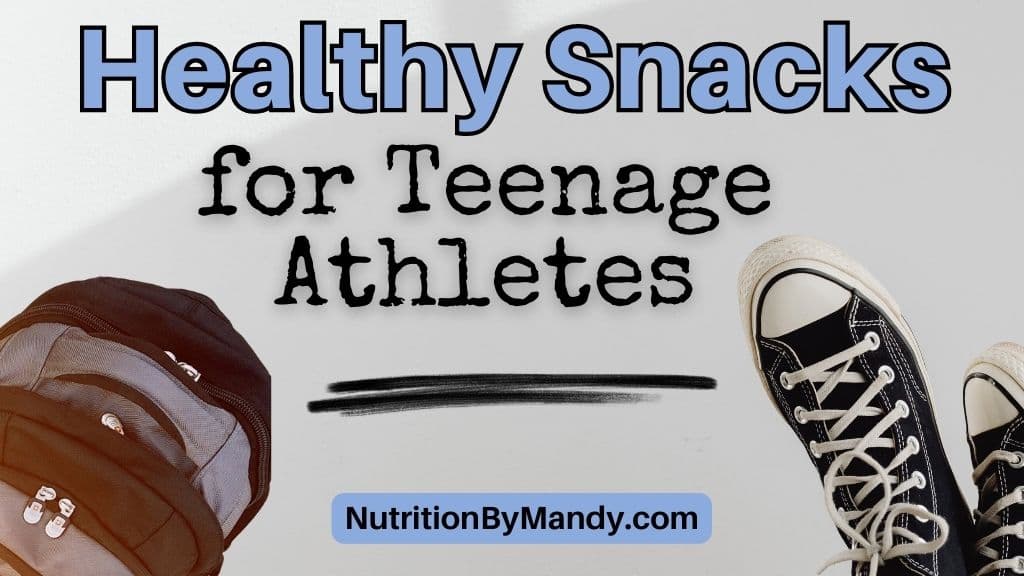Last Updated on March 7, 2025 by Mandy Tyler, M.Ed., RD, CSSD, LD
50+ Healthy Snacks for Teenage Athletes
*This article includes affiliate links. As an Amazon Associate, I earn from qualifying purchases.
As a sports dietitian, I am commonly asked for suggestions on healthy snacks that teenage athletes can add to their sports nutrition meal plans.
Let’s explore the importance of snacks for teenage athletes. Then we will identify ways to add snacks to a teenage athlete’s diet as well as 50+ healthy snack ideas.
Importance of Healthy Snacks for Teenage Athletes
One common reality of teenage athletes is that they are busy. Between school, homework, practice, and competitions, there is limited time available for teen athletes to consider what and when to eat.
With all of the activities that teenage athletes are involved in, having a plan in place for meeting their sports nutrition needs is important.
Including healthy snacks in a teenage athlete’s meal plan can help fuel their activities and support their overall health and well-being.
In addition, well-planned snacks can fill nutrient gaps in a teen athlete’s diet and help ensure their daily calorie needs are met.

Tips for Adding Healthy Snacks to a Teenage Athlete’s Meal Plan
It can be helpful to have ideas for adding snacks to a teenage athlete’s meal plan. Below are a few simple strategies to consider.
Make Healthy Snacks Easy for Teenage Athletes
On the weekend, take time to plan ahead and meal prep snacks for the week. Prepping snacks in advance can save you valuable time on busy weekdays.
Consider the following meal prep and ingredient prep tasks that can be done ahead of time:
- Prepackage individual bags of trail mix, pretzels, snack crackers, or nuts
- Hard-boil eggs
- Wash and chop fresh fruits and vegetables
- Pack individual containers of hummus or nut butter
Create snack baskets in your fridge and pantry so that it is easy for your teen athlete to grab a healthy snack on the way out the door.

Make Snacks A Combo
When planning healthy snacks for your teenage athlete, aim to create a balanced snack that combines a food providing protein along with a food providing a good source of carbohydrates.
The protein from the snack will support teen athletes with building and maintaining muscle mass. The carbohydrates will provide teen athletes with energy for their daily activities.
Healthy Snack Combos for Teenage Athletes
Here are some of my favorite healthy snack combos for teenage athletes:
- Crunchy granola bars with peanut butter
- String cheese with grapes
- Beef jerky with pretzels
- Greek yogurt with blueberries and granola
- Hummus with pita chips and mini peppers
- Graham crackers with low-fat milk
- Protein toaster waffles with almond butter
- Cheese stick with a banana
- Hard-boiled eggs with breakfast bars
- Greek yogurt drink with fig bars
- Nut butter with celery sticks and pretzels
- High-protein milk with whole grain cereal
- Tuna pouch with whole grain crackers
- Roast beef and cheese in a pita pocket
- Low-fat bean dip with baked tortilla chips
- Apple slices with almonds
- Cottage cheese with pineapple
- Rice cakes with Sunbutter®
- Oatmeal with walnuts and raisins
- Edamame with orange wedges
- Turkey wrap (turkey, cheese, whole wheat tortilla)
- Peanut butter and jelly on honey wheat bread (can’t go wrong with this classic!)
Have Teenage Athletes Pack Their Healthy Snacks in Advance
I find teenage athletes often skip snacking simply because they do not have food available. Packing snacks in advance, in multiple locations, can help ensure your teenager has a healthy snack available when needed.
Encourage your teenage athlete to think about all the different locations they can pack healthy snacks to have available when needed.
Here are some easy ideas:
- Backpack
- School locker
- Gym bag
- Glovebox of car

Packaged Snacks for Teenage Athletes
I am frequently asked to share my favorite packaged snack ideas for teenage athletes. Below are a variety of suggestions for packaged snacks that athletes can easily toss into their backpack or keep in their school locker.
- Planters® NUT-rition (available on Amazon): Trail mix
- Righteous Felon® (available on Amazon): Beef and turkey jerky
- Chomps®: Meat sticks
- That’s it® (available on Amazon): Fruit bars
- Kate’s® Real Food: Protein bars and energy bars
- Made Good®: Granola bars and granola minis
- Nature’s Bakery®: Fig bars
- Gourmet Nut® Power Up Trail Mix: Trail mix varieties
- Planters® NUT-rition (available on Amazon): Trail mix
Healthy Pre-Workout Snacks for Teenage Athletes
When planning snacks for the day, teen athletes should make sure to include snacks that they can enjoy before a workout. Athletes want to ensure they go into their workouts well fueled so they have the energy needed to train and perform at their best.
Easy-to-digest, high-carb snacks are the best choice for athletes to eat when they have limited time before a practice.
Eating snacks that are high in fat, fiber, and/or protein too close to the start of activity may result in an upset stomach during the practice (1).
I encourage teen athletes that participate in afterschool sports to be particularly mindful about packing snacks they can eat as they head to practice.
Pre-Workout Snack Ideas for Teen Athletes
Easy ideas for carbohydrate-rich snacks teen athletes can enjoy before a practice include:
- Applesauce squeeze pouches
- Fresh Fruit: Banana, apples, orange wedges, grapes
- Dried fruit: Raisins, cranberries, dates, pineapple, mango
- Fruit leather, fruit snacks
- Fruit cup (packed in natural juices)
- Pretzels, pita chips, snack crackers
- Animal crackers, graham crackers
- Granola bars, granola bites
- Cereal bars, fig bars
- Dry breakfast cereal, mini bagels
Healthy Post-Workout Snacks for Teenage Athletes
Following a workout, make sure your teenage athlete is equipped with snacks that can support their recovery nutrition needs.
Following a workout, athletes should focus on consuming the following:
- Fluid and Electrolytes: Rehydrate to replace fluid and electrolytes lost in sweat
- Carbohydrates: Refill energy stores (glycogen stores) used during the activity
- Protein: Build and repair muscles
If it will be several hours until the next meal, teenage athletes should eat a post-workout snack following their practice.
This is especially important for teenage athletes following a morning practice at school. Consuming a post-workout snack can support both their recovery nutrition needs and provide them with energy for the upcoming school day.

Healthy Post-Workout Snacks for Teenage Athletes
Quick and easy snacks athletes can enjoy following a workout include:
- Low-fat chocolate milk and granola bars
- Peanut butter and jelly sandwich with low-fat milk
- Greek yogurt, berries, and granola
- Turkey jerky, pretzels, tart cherry juice
- Protein muffins, banana, low-fat milk
- Sliced cheese, turkey, and whole grain crackers with low-fat milk
- Ham and cheese sandwich with 100% fruit juice
- Bagel with nut butter, honey, and banana slices
- Trail mix with pretzels, dried fruit, nuts, and dry cereal with sports drink
- Sports bar with sports drink
- Post-workout fruit smoothie
Encourage Teenage Athletes to Hydrate with Snacks
Hydration is an essential part of a teenage athlete’s sports nutrition meal plan. Dehydration can negatively impact their health as well as sports performance (2).
Teenage athletes should aim to include nutritious beverages with their snacks to help with meeting their daily hydration needs.
Ideas for drinks that teenage athletes can enjoy with their snacks include:
- Water
- Low-fat milk
- High-protein milk
- 100% fruit juice
- 100% vegetable juice
- Sparkling water
- Infused water
Infused Water with Healthy Snacks
Infused water can be another great option for teenage athletes to enjoy with their snacks.
Making infused water can be as simple as adding cucumber slices or an orange wedge to a water bottle at the beginning of the day. As the athlete refills their water bottle throughout the day the water will continue to have a refreshing flavor.

Healthy Snacks for Teenage Athletes: Focus on Consistency
The importance of consistency is a key concept I often share with teenage athletes. Making healthy snacks a routine part of their meal plan can help fill gaps in their diet and support their overall sports nutrition goals.
For additional suggestions on ways to help your teenage athlete meet their performance nutrition needs visit with a sports dietitian nutritionist.
The sports dietitian can work with your teen on developing a customized sports nutrition meal plan to support optimal performance.
Healthy Snacks for Teenage Athletes
You are now set with a variety of healthy snack ideas for teenage athletes. As a reminder, teenage athletes should plan head to ensure they have healthy snacks available with them throughout the day.
For additional ideas on supporting the nutrition needs of teenage athletes, make sure to check out my blog with breakfast on-the-go ideas for teens.
Join the Nutrition By Mandy Email List & Get a Free Athlete’s Grocery List
Click HERE to join the Nutrition By Mandy e-mail list. When you join you will receive a free athlete’s grocery list to print and take with you to the store.
About the Author
Mandy Tyler is a Sports Dietitian Nutritionist in the San Antonio, TX area. She is a Registered and Licensed Dietitian, a Board-Certified Specialist in Sports Dietetics, a Licensed Athletic Trainer, and is a Certified Exercise Physiologist through the American College of Sports Medicine. Mandy has experience working with athletes at the high school, collegiate, and professional levels. She believes the key to reaching one’s full potential, both in everyday life and in sports performance, relies on a healthy nutritional foundation.

If you are looking to take your performance to the next level, make sure to check out my new Sports Nutrition Game Day Guide. This downloadable guide is written to help athletes develop an individualized plan to achieve peak performance on game day.





